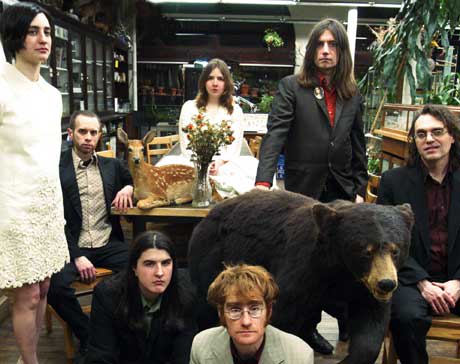Alec K. Redfearn has a long and varied musical history, almost all of it involving sprawling bands with diverse instrumentation, and has spent the past ten years with his ensemble, the Eyesores. Determinedly out of step with musical fashions of the day (he gravitated to playing accordion because he found grunge revisionist), he nevertheless found his gypsy-folk-noise-drone-style of composition firmly in vogue last year, with the resurgence of folk and Balkan music. Hes responded by upping the ante with The Blind Spot, an ambitious song cycle that incorporates choral arrangements and a soprano vocalist, lending a true requiem-like feel to this meditation on loss and addiction. Redfearn is in top form here, directing the magic collision of spiralling waltzes with the drone of a specially built hurdy-gurdy. Despite the dark theme, the music is still exquisitely pretty, with segues between songs as integral as the compositions themselves. Artful yet entirely genuine, this is the most accomplished Eyesores record to date.
Ive heard youre self-taught on the accordion.
Eventually I did take a few lessons but mostly I went through the Palmer Hughes beginner accordion books. I bought an accordion entirely on impulse; there was another Providence group called the Smiling Dog Band that did incredible, dervish-like takes on English folk and Appalachian music, and had three accordion players. When I first picked one up I thought, "this is like having a large animal on your chest. It is an incredibly awkward instrument, and learning the physicality of it is integral to what you create.
The song cycle is a eulogy for friends youve lost to addiction. Why did you want to write a longer work?
Because it allows me to take a series of ideas and reinterpret them: pull them apart and put them back together. The song cycle, which begins at track four and goes to the end, has a lot of different motifs that come up in various places. I spent a couple of years in a blur, of basically alcohol, cocaine and heroin [use] in heavy quantities. I got out of it before anything massively tragic happened but a lot of the people who I was using with died, people who had actually been instrumental to me getting out. I dont know if I was successful in eulogising anyone but it took the larger group to push this forward, and Im glad that I did.
(Cuneiform)Ive heard youre self-taught on the accordion.
Eventually I did take a few lessons but mostly I went through the Palmer Hughes beginner accordion books. I bought an accordion entirely on impulse; there was another Providence group called the Smiling Dog Band that did incredible, dervish-like takes on English folk and Appalachian music, and had three accordion players. When I first picked one up I thought, "this is like having a large animal on your chest. It is an incredibly awkward instrument, and learning the physicality of it is integral to what you create.
The song cycle is a eulogy for friends youve lost to addiction. Why did you want to write a longer work?
Because it allows me to take a series of ideas and reinterpret them: pull them apart and put them back together. The song cycle, which begins at track four and goes to the end, has a lot of different motifs that come up in various places. I spent a couple of years in a blur, of basically alcohol, cocaine and heroin [use] in heavy quantities. I got out of it before anything massively tragic happened but a lot of the people who I was using with died, people who had actually been instrumental to me getting out. I dont know if I was successful in eulogising anyone but it took the larger group to push this forward, and Im glad that I did.
